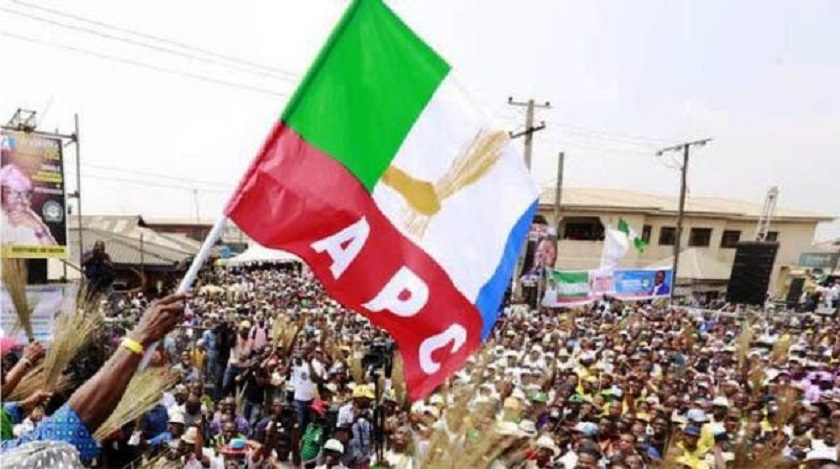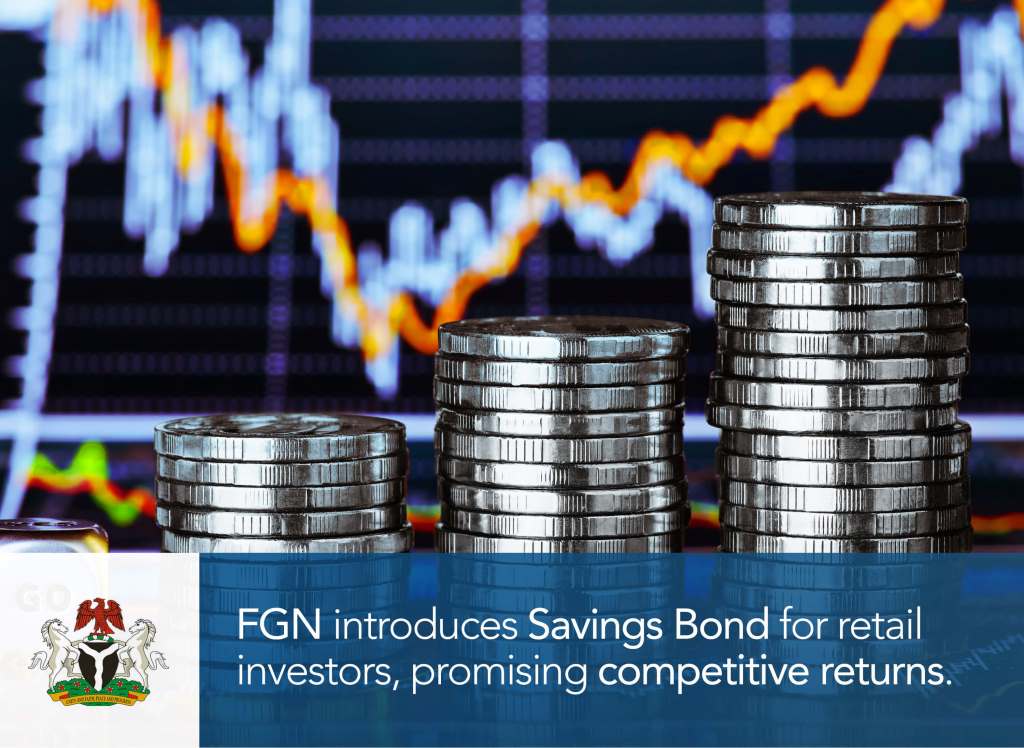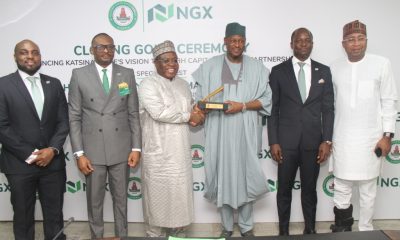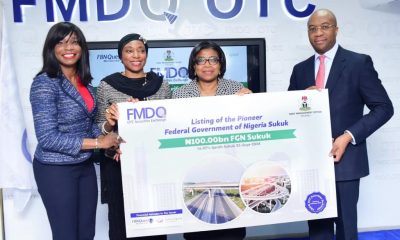General
Nigeria Funds 124 Road Projects With N1.1trn Sukuk Sales

By Adedapo Adesanya
Nigeria issued six sovereign Sukuk worth N1.1 trillion ($657.6 million) to finance 124 federal road projects covering over 5,820 kilometres across the six geopolitical zones of the country in 2024.
Sukuk, also known as Islamic bonds, are financial instruments compliant with Islamic tenets that generate returns for investors. They don’t involve interest payments, which are prohibited.
The Director General of the Securities and Exchange Commission (SEC), Mr Emomotimi Agama, while speaking at the 2nd International Islamic Capital Market Conference in Karachi, Pakistan, a few days ago, said the success rate makes the Islamic Capital Market (ICM) stand out as a resilient and innovative tool for mobilising resources in the country, where funding is needed.
Mr Agama described the issuance of sovereign Sukuk since 2017 as a key pillar responsible for the growth of the ICM in Nigeria adding that these issuances have consistently been oversubscribed, with subscription rates reaching as high as 441 per cent, adding that sub-national and corporate Sukuk issuances are also growing in Nigeria.
Notable examples include Osun and Lagos states, Family Homes Ltd, and TAJ Bank Plc, along with private Sukuk issuances by three other sub-nationals, saying that these instruments have been instrumental in funding school infrastructure, housing and a first of its kind in Nigeria, tier 1 capital for a bank and underscores the versatility of Sukuk as a financing tool.
“Beyond Sukuk, the ICM segment in Nigeria offers diverse investment opportunities. From one registered fund in 2008, the segment currently boasts of 14 registered Halal mutual funds with a net asset value exceeding ₦105 billion as of November 2024. The NGX Lotus Islamic Index tracks 11 Shariah-compliant equities, while Nigeria’s first Islamic Real Estate Investment Trust – ChapelHill N-REIT – highlights the potential of real estate investments.
“The prospects for Nigeria’s Islamic finance industry are underpinned by key growth drivers, both global and domestic. Globally, demographic trends, economic diversification efforts in oil-dependent economies, and regulatory support have spurred demand for Sharia-compliant products.
“Locally, Nigeria’s large Muslim population, government-backed Sukuk initiatives, and growing investor awareness are driving market expansion. Emerging innovations in fintech also present further opportunities for market development. In that regard, the SEC-registered the first Robo advisory firm in the Nigerian Capital Market in 2022. This Robo Advisor is focused on Shari’ah-compliant investments,” he said.
Mr Agama said the success of the ICM in Nigeria is deeply rooted in its strategic focus on infrastructure financing, financial inclusion, and sustainability as the SEC’s engagement with the ICM dates back to 2004, when the SEC joined the Islamic Finance Task Force of the International Organization of Securities Commissions (IOSCO).
The SEC boss said this commitment was followed by the issuance of Islamic fund and Sukuk Rules in 2010 and 2013, respectively and later solidified in the Non-Interest Capital Market Master Plan (2015–2025), which outlines a 10-year roadmap for expanding the market’s depth and diversity.
Adopted in 2015 as part of the broader Nigerian Capital Market Master Plan (2015–2025), the Non-Interest Capital Market Master Plan (NICMMP) has been central to the development of the ICM segment in Nigeria. ‘
The document sets out a vision for the Islamic Capital Market – otherwise known as the Non-Interest Capital Market (NICM) in Nigeria – to contribute 25 per cent of total market capitalization by 2025, with Sukuk accounting for 15 per cent.
“The masterplan was further reviewed in 2021, to provide a renewed focus on deepening the ICM, through targeting 50 listings of sharia-compliant products with market capitalisation of at least N5 trillion ($11 billion) by 2025.
“The performance of the NICM Masterplan has been remarkable. Of the 15 initiatives outlined in the roadmap, nine had been fully implemented as of 2022, representing a 70 per cent success rate. Key achievements include improved public awareness, increased retail participation in Sukuk, and the introduction of the Non-Interest Pension Fund (Fund VI) through collaboration with the National Pension Commission (PenCom).
“Another key achievement was the release of guidelines for taxation of Non-Interest transactions, in collaboration with the FIRS. This solved the challenge of double taxation hindering such transactions,” he said.
General
Nigeria’s Democracy Suffocating Under Tinubu—Atiku

By Modupe Gbadeyanka
Former Vice President, Mr Atiku Abubakar, has lambasted the administration of President Bola Tinubu for the turnout at the FCT Area Council elections held last Saturday.
In a statement signed by his Media Office, the Adamawa-born politician claimed that the health of Nigeria’s democracy under the current administration was under threat.
According to him, “When citizens lose faith that their votes matter, democracy begins to die. What we are witnessing is not mere voter apathy. It is a direct consequence of an administration that governs with a chokehold on pluralism. Democracy in Nigeria is being suffocated slowly, steadily, and dangerously.”
He warned that the steady erosion of participatory governance, if left unchecked, could inflict irreversible damage on the democratic fabric painstakingly built over decades.
“A democracy without vibrant opposition, without free political competition, and without public confidence is democracy in name only. If this chokehold is not released, history will record this era as the period when our hard-won freedoms were traded for fear and conformity,” he stressed.
Mr Atiku said the turnout for the poll was below 20 per cent, with the Abuja Municipal Area Council (AMAC) recording 7.8 per cent.
He noted that such civic participation in the nation’s capital, the symbolic heartbeat of the federation, is not accidental, as it is the predictable outcome of a political environment poisoned by intolerance, intimidation, and the systematic weakening of opposition voices.
The presidential candidate of the People’s Democratic Party (PDP) in the 2023 general elections stated that the ruling All Progressives Congress (APC) under Mr Tinubu has pursued a deliberate policy of shrinking democratic space, harassing dissenters, coercing defectors, and fostering a climate where alternative political viewpoints are treated as threats rather than contributions to national development.
He called on opposition parties and democratic forces across the country to urgently close ranks and forge a united front, declaring, “This is no longer about party lines; it is about preserving the Republic. The time to stand together to rescue and rebuild Nigeria is now.”
General
Nigeria Eyes Full Entry into Council of Palm Oil Producing Countries

By Adedapo Adesanya
Nigeria is set to validate a technical committee report geared towards transitioning the country from observer status to full membership of the Council of Palm Oil Producing Countries (CPOPC) in April.
Mr Abubakar Kyari, Minister of Agriculture and Food Security, said this when the council’s mission visited him over the weekend in Abuja, noting that the ministry had constituted a technical committee to consider how the country would seamlessly transit from observer country to membership in CPOPC based on its strategic importance in palm oil production.
“We are conscious of the fact that the palm oil value chain is very strategic for us and identified it as an export crop that can drive foreign exchange for the country and ensure good health in terms of consumption.
“We are conscious of the fact that we need the support of CPOPC countries to provide the country with a new variety of seeds that are climate-smart and resistant so that they can be produced by farmers in the country,” he said.
Mr Alphonsus Inyang, President, National Palm Produce Association of Nigeria (NPPAN), said being a member of CPOPC Nigeria would target over 10 million tonnes of oil palm between 2026 and 2050.
“We are also targeting 2.5 million hectares from among Nigeria households who are out to produce one hectare each, geared towards a N20 trillion annual economy within this period from among Nigeria households.
“We are working side by side with the big players who will be developing plantations,” he said.
The Secretary-General of CPOPC, Ms Izzana Salleh, said the council’s mission to Nigeria was to see how the country could transit from observer status to full membership, among others
She said that the status of the country as an observer nation since 2024 would expire by November.
Ms Salleh assured the country of the council’s readiness to support its vision to strengthen domestic production, enhance food security and build a competitive and sustainable palm oil supply chain.
The official emphasised that being a member of the council would strategically position Nigeria for a greater future regarding oil palm production.
According to her, the visit is to strengthen the council’s engagement with Nigeria, including potential membership in CPOPC.
She said: “The council’s mission to Nigeria aims to advance both Nigeria’s national ambitions and Africa’s collective voice in global agricultural discussions.
“CPOPC was established to promote cooperation among producing nations, empower smallholders, advance sustainability, and ensure fair, science-based global dialogue on vegetable oils.
She emphasised that being a member of the council would strategically position the country for greater future prospects regarding oil palm production and the value chain, as well as export.
“We are ready to support Nigeria’s vision to strengthen domestic production, enhance food security, and build a competitive and sustainable palm oil supply chain,” she said.
General
Violence Mars APC Ward Congress in Oluyole

By Modupe Gbadeyanka
The ward congress of the All Progressives Congress (APC) in Oluyole Local Government Area of Oyo State on Saturday left several party members injured after a violence clash erupted.
According to reports, one of the injured persons was Mr Idowu Oyawale, who served as the campaign Director General of a House of Representatives member in the last general elections, Ms Tolulope Akande-Sadipe.
It was disclosed that he sustained severe injuries during the exercise and is currently receiving treatment at an undisclosed hospital.
The ward congress was organised by the ruling party to elect ward executives across the local government’s wards.
However, it was disrupted at Olomi Ward 7 by suspected heavily-armed political thugs allegedly linked to a member of the party.
It was claimed that the thugs invaded the congress venue at Olomi Basic School 1, dispersing party members and officials supervising the exercise, with stones, clubs and other weapons.
Eyewitnesses said tensions escalated unprovoked over delegates’ lists and ward executive positions. The disagreement reportedly degenerated into physical altercations before the violent attacks on some party members.
It was learnt that security operatives led a tactical team to restore order, peace, and disperse the attackers.
Reacting to the incident, some party leaders and elders condemned the violence, describing it as unfortunate and capable of undermining the credibility of the internal democratic process.
The leaders have called on party chieftains and President Bola Tinubu to immediately order an investigation into the violent attacks.
-

 Feature/OPED6 years ago
Feature/OPED6 years agoDavos was Different this year
-
Travel/Tourism10 years ago
Lagos Seals Western Lodge Hotel In Ikorodu
-

 Showbiz3 years ago
Showbiz3 years agoEstranged Lover Releases Videos of Empress Njamah Bathing
-

 Banking8 years ago
Banking8 years agoSort Codes of GTBank Branches in Nigeria
-

 Economy3 years ago
Economy3 years agoSubsidy Removal: CNG at N130 Per Litre Cheaper Than Petrol—IPMAN
-

 Banking3 years ago
Banking3 years agoSort Codes of UBA Branches in Nigeria
-

 Banking3 years ago
Banking3 years agoFirst Bank Announces Planned Downtime
-

 Sports3 years ago
Sports3 years agoHighest Paid Nigerian Footballer – How Much Do Nigerian Footballers Earn


















